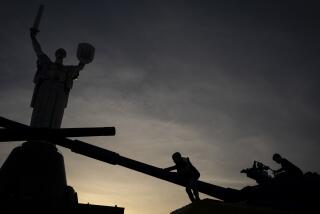The President’s Next Crisis: The Coming Third Balkan War : Geopolitics: The flash point for a war involving Greece, Turkey, Bulgaria, Serbia and Albania could be newly proclaimed Slav Macedonia.
- Share via
WASHINGTON — The next President faces the most dangerous international crisis since the end of the Cold War. In the southern Balkans and the eastern Mediterranean, a real Greek tragedy is in the making, with Western spectators, so far, blithely ignoring the warnings offstage. Even today, all the political and psychological ingredients for what may be the third Balkan war of this century are present there.
The most likely flash point for a wide-ranging war involving Greece, Turkey, Bulgaria, Serbia and Albania is the Slav “Macedonian socialist republic.” When the former Yugoslav republic declared independence last year, Greece was furious. To Greeks, Macedonia is a concept and name belonging exclusively to them, harking, as it does, back to Alexander the Great of Macedonia and his father, King Philip II.
Moreover, Greece suspects that the Slav Macedonian majority has territorial designs on Greek Macedonia. It has battled, thus far successfully, against recognition of the new entity by the European Community. Athens, where patriotic furor over the Macedonian issue overwhelms all else, is willing to accept the republic if it agrees to call itself Skopje, its capital, and drops the Macedonian star and sun rays from its flag and emblems. But the Slav Macedonians refuse to compromise. The scene is thus set for a clash certain to draw in all Greece’s neighbors.
Turkey, Greece’s nemesis since it gained independence from the Ottoman Empire more than a century and a half ago, wasted no time in recognizing Skopje, which the Greeks interpreted as a hostile gesture consistent with what they regard as Turkish ambitions to become the regional superpower. The only other countries to recognize Skopje are Bulgaria, which has claims on Macedonian territories and is said to entertain dreams of a “Greater Bulgaria,” and Russia, which apparently strives to regain influence in the Balkans.
To be sure, the Macedonian question has a long history; people in the Balkans have unbelievably long memories when it comes to national, ethnic and religious matters. The 1912 and 1913 Balkan wars began over Macedonia, with Greece, Bulgaria and Serbia uniting to chase the Turks out of the Balkans. They culminated in the Greek capture of Salonika, then Macedonian capital, from Turkey.
A conflict over Macedonian territories would inevitably pit Greece against Turkey, both of them members of the North Atlantic Treaty Organization. About 21% of the inhabitants of Skopje are Albanian Muslims, and Turkey does not hide its sympathies for Muslim minorities and Muslim communities everywhere. Ankara provides limited economic aid to Skopje and limited military assistance to Bosnian Muslims, trains Albanian army officers under a defense agreement, and sympathizes with Muslims in ex-Soviet Azerbaijan and with Turkish-descended citizens of Abkhazia and Georgia. In a broader context, of course, Turkey is busy establishing its sway over the Muslim republics of the former Soviet Union.
Though Turkey is regarded as a secular state dominated by the Muslim religion, ethnic sensitivities are easily aroused. After a U.S. aircraft carrier accidentally fired a missile at a Turkish destroyer during NATO maneuvers in the Aegean in September, killing five sailors, the speaker of the Turkish Parliament, Husamettin Cindoruk, charged that it probably was not accidental, and the navy commander-in-chief, Adm. Vural Beyazit, announced that the U.S. Navy had been requested to disclose the “ethnic origins” of the American missile crew involved.
These attitudes may well push Turkey into deeper involvement in the Balkans if the Serbs, as generally expected, turn their attentions to the former Yugoslav autonomous province of Kosovo. Kosovo, wedged between Albania and Macedonia, has 1.7 million Muslim Albanian inhabitants--90% of its population--and most experts assume that the Serb regime in Belgrade, under Slobodan Milosevic, will strike for full control of the province as soon as it has completed the partition of Bosnia between itself and the Croats.
Milosevic, who deprived Kosovo of its local leadership three years ago, considers the province his “southern front,” fearing growth in the Albanian population and seemingly contemplating more “ethnic cleansing.” In a 1988 speech, he promised that “We shall win the battle for Kosovo regardless of the obstacles facing us inside and outside the country.” There is no reason not to take him at his word. In a report released last week, Tadeusz Mazowiecki, an official human-rights investigator for the United Nations, said he found early signs of ethnic cleansing in Kosovo.
Indications are that explosions in Kosovo and Macedonia could come simultaneously, perhaps in a matter of months, and become merged into a single, ever-expanding conflict, with Greece and Turkey the principal initial adversaries. Whereas Bosnia is, after a fashion, a civil war, fighting in Macedonia and Kosovo would be instantly internationalized. This is especially true of Macedonia, a strategic area controlling north-south routes through the Balkan mountains. Athens and Ankara would be under enormous pressure to intervene if today’s fragile status quo were disturbed.
For three decades, Greece and Turkey have been at odds over the future of Cyprus, a highly strategic island in the eastern Mediterranean that was split into Greek and Turkish communities following the 1974 invasion by Turkey’s armed forces. A U.N. force stationed there for the last 28 years maintains the peace, but recent diplomatic efforts at an overall settlement are not progressing. The two nations have other unresolved problems.
It may be shocking, though not surprising, that Greece and Turkey are entering an arms race. Because Turkey has 110 F-16 jet fighter-bombers, built in Turkey under U.S. license, Greece is buying 40 additional F-16s to augment its force of 40 F-16s and 40 French Mirage 2000s. Greece is buying armor, now stationed in Germany, from the United States, and the Greek Cypriot government is spending about $1 million daily on arms from Western and Eastern Europe to counter the 30,000-man Turkish regular army in the north of the island.
Add to this the scary rhetoric on the Balkans. Turkey’s President Turgut Ozal warned recently that if Bosnian clashes are not stopped, “(the fighting) might inevitably spread to a much wider area and could turn into a disaster that might engulf the whole of the Balkans.” President Kiro Gligorov of Skopje announced, in mid-October, that “recognition of ‘Macedonia’ as an independent state is an urgent problem to prevent a spillover of the (Bosnian) war to Kosovo.” A month earlier, Greek leftist opposition leader Andreas Papandreou claimed that “we are faced with a dramatic loss of all of our traditional foreign-policy supports in the region--to the benefit of an Islamic arc led by Turkey.” Kathimerini, Athens’ most influential newspaper, concluded last week that “exactly north of our borders, there is a bomb ready to explode at any moment.”
Cyrus R. Vance, former U.S. secretary of state and currently the chief U.N. representative at the Geneva talks on Yugoslavia, put it even more starkly: the Yugoslav conflict, he said, could spread to neighboring countries if the situation in Macedonia and Kosovo are allowed to “fester.” Added Vance: “A spark from Macedonia could ignite the region.”
Clearly, such a scenario would affect fundamental U.S. interests. Has Bill Clinton or George Bush given the Balkans the attention the region so desperately merits? Or are we to witness another drama in silence, a vastly greater one than Bosnia-Herzegovina?
More to Read
Sign up for Essential California
The most important California stories and recommendations in your inbox every morning.
You may occasionally receive promotional content from the Los Angeles Times.










